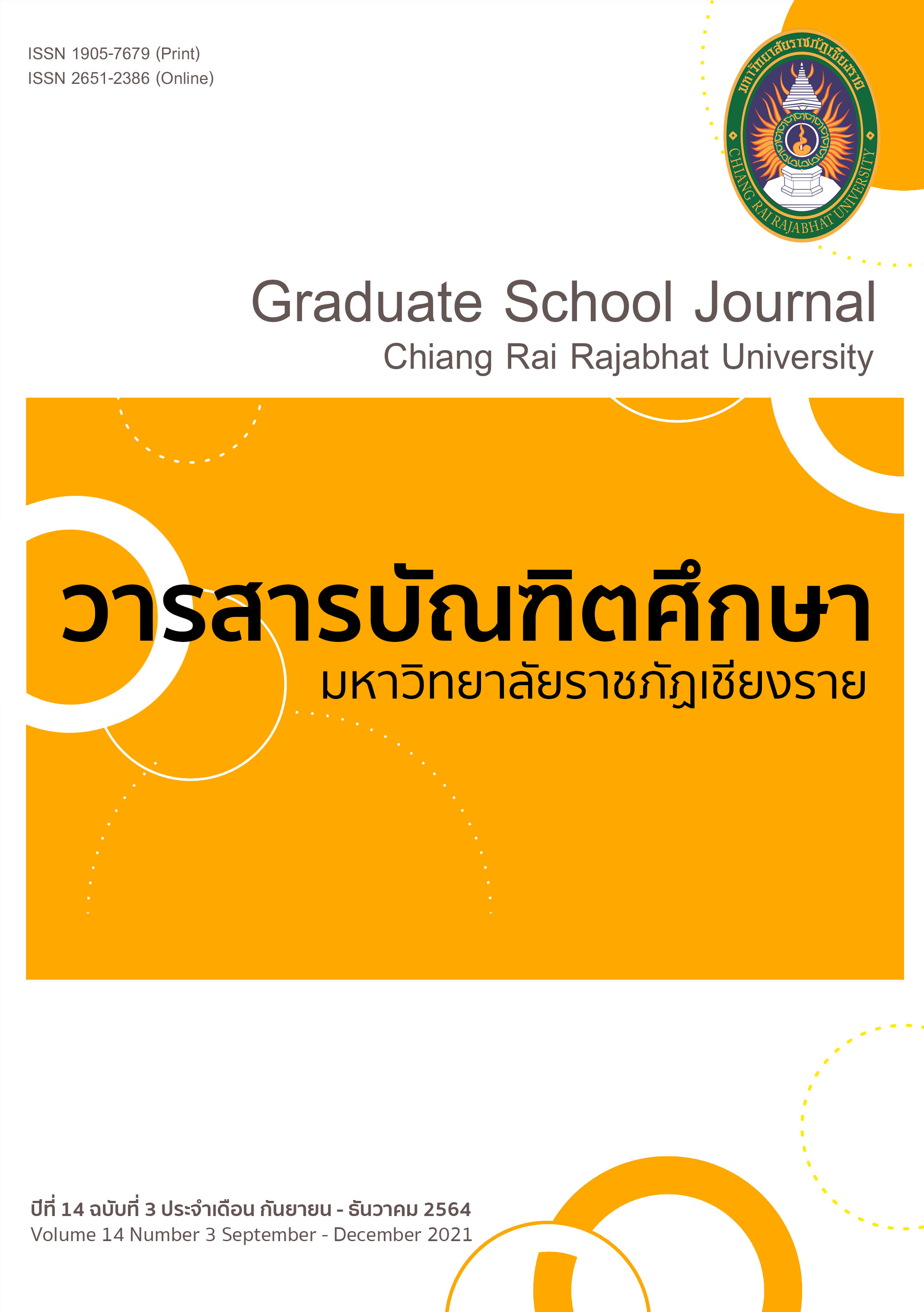ผลของบอร์ดเกมต่อฟังก์ชันสติปัญญาด้านการรับรู้ของผู้เรียน
Main Article Content
บทคัดย่อ
บอร์ดเกมเป็นที่พูดถึงกันมากและใช้กันอย่างแพร่หลายในวงการศึกษาประเทศแถบยุโรปและอเมริกา รวมถึงเอเชียบางประเทศ อาทิ สิงค์โปร ฮ่องกง จีน และญี่ปุ่น เรียกได้ว่าเป็นเรื่องปกติที่นำบอร์ดเกมมาใช้ในการจัดการเรียนการสอน สำหรับประเทศไทยเริ่มให้ความสนใจกับการใช้บอร์ดเกมมากขึ้น แต่ยังไม่เป็นที่แพร่หลาย ด้วยคุ้นชินกับการสอนแบบบรรยายประกอบสื่อ แล้วตรวจสอบผลการรับรู้บทเรียนด้วยการทำแบบฝึกหัด และอีกประการ คือ ยังไม่มั่นใจในบอร์ดเกมว่าเกิดประโยชน์ และสามารถส่งเสริมฟังก์ชันสติปัญญาได้ จุดประสงค์ของบทความนี้ต้องการสนับสนุนผลของบอร์ดเกมต่อฟังก์ชันสติปัญญาด้านการรับรู้ของผู้เรียน โดยแสดงให้เห็นถึงความสัมพันธ์ทางหลักการ แนวคิด รวมถึงตัวอย่างงานวิจัย เพื่อเห็นความชัดเจนของการใช้บอร์ดเกมต่อผลการรับรู้ ซึ่งพบว่า บอร์ดเกมมีผลในเชิงบวกต่อผลฟังก์ชันสติปัญญาของผู้เรียนเมื่อนำมาใช้ในการจัดการเรียนสอน โดยมีร้อยละของการรับรู้และความรู้เพิ่มขึ้น และยังส่งผลต่อการคลายความวิตกกังวลในการเรียนรู้ นอกจากนี้ยังมีส่วนช่วยในการปรับปรุงและเสริมสร้างปฏิสัมพันธ์ระหว่างบุคคล แรงจูงใจในการเรียน การค้นพบชี้ให้เห็นว่าบอร์ดเกมสามารถแก้ปัญหากระบวนการเรียนรู้ได้อย่างมีประสิทธิภาพ
Article Details
บทความที่ได้รับการตีพิมพ์เป็นลิขสิทธิ์ของวารสารมหาวิทยาลัยราชภัฎเชียงราย
ข้อความที่ปรากฏในบทความแต่ละเรื่องในวารสารวิชาการเล่มนี้เป็นความคิดเห็นส่วนตัวของผู้เขียนแต่ละท่านไม่เกี่ยวข้องกับมหาวิทยาลัยราชภัฎเชียงราย และคณาจารย์ท่านอื่นๆในมหาวิทยาลัยฯ แต่อย่างใด ความรับผิดชอบองค์ประกอบทั้งหมดของบทความแต่ละเรื่องเป็นของผู้เขียนแต่ละท่าน หากมีความผิดพลาดใดๆ ผู้เขียนแต่ละท่านจะรับผิดชอบบทความของตนเองแต่ผู้เดียว
เอกสารอ้างอิง
ฐปนนท์ สุวรรณกนิษฐ์. (2560). การออกแบบเกมการ์ดเพื่อสร้างความเข้าใจในการเรียนหลักสูตรออกแบบสื่อสาร. ในเอกสารรวบรวมบทความวิจัยหลังการประชุมวิชาการนเรศวรวิจัยครั้งที่ 13 : วิจัยนวัตกรรมขับเคลื่อนเศรษฐกิจและสังคม. มหาวิทยาลัยนเรศวร (หน้า 1700-1715). จังหวัดพิษณุโลก : มหาวิทยาลัยนเรศวร
ธีรภาพ แซ่เชี่ย. (2560). การใช้บอร์ดเกมประเภทวางแผนเพื่อพัฒนาทักษะการคิดอย่างมีวิจารณญาณในนักเรียนระดับมัธยมศึกษาชั้นปีที่ 3 ในโรงเรียนขนาดใหญ่ สังกัดสำนักงานเขตการศึกษาขั้นพื้นฐาน จังหวัดปทุมธานี. (วิทยานิพนธ์ศึกษาศาสตร์มหาบัณฑิต). มหาวิทยาลัยธรรมศาสตร์. กรุงเทพมหานคร.
นภาศรี สงสัย และ ทิพรัตน์ สิทธิวงศ์. (2563). การศึกษาผลการใช้บอร์ดเกมประกอบการเรียนการสอนรายวิชาวิทยาศาสตร์ เรื่อง ระบบนิเวศเพื่อส่งเสริมความสามารถในการคิดวิเคราะห์ สำหรับนักเรียนชั้นมัธยมศึกษาปีที่ 3 โรงเรียนศรีสำโรงชนนูปถัมภ์. วารสารกลุ่มมนุษยศาสตร์-สังคมศาสตร์, 3(2), 1-11.
นัท กุลวานิช และ อัครินทร์ ไพบูลย์พานิช. (2561). ผลสัมฤทธิ์ทางการเรียนและความพึงพอใจของการใช้บอร์ดเกม“Sue-hirokari Sukoroko” ในการสอนการแจกแจงแบบทวินาม. วารสารวิทยาศาสตร์ มหาวิทยาลัยขอนแก่น, 46(3), 572-584.
พวงรัตน์ ทวีรัตน์. (2543). วิธีการวิจัยทางพฤติกรรมศาสตร์และสังคมศาสตร์. (พิมพ์ครั้งที่ 8). กรุงเทพมหานคร: เจริญผล.
ฟิสิกส์ ฌอณ บัวกนก. (2564). นวัตกรรมและเทคโนโลยีสารสนเทศเพื่อการสื่อสารการศึกษาและการเรียนรู้. กรุงเทพมหานคร: ดีเซมเบอร์.
มงคล ศุภอำพันวงษ์. (2562). การออกแบบบอร์ดเกมส่งเสริมปลูกฝังการอนุรักษ์สัตว์ป่าสงวน. กรุงเทพมหานคร: ภาควิชาแอนิเมชันและสื่อสร้างสรรค์ คณะเทคโนโลยีสารสนเทศ มหาวิทยาลัยสยาม.
วราภรณ์ ลิ้มเปรมวัฒนา และ กันตภณ ธรรมวัฒนา. (2560). พฤติกรรมในการเล่นบอร์ดเกมและองค์ประกอบ ของปัจจัยทางด้านผลกระทบจากการเล่นเกมของวัยรุ่นในเขตกรุงเทพมหานคร. วารสารวิจัยสังคม, 40(2), 107-132.
แสงเดือน ทวีสิน. (2545). จิตวิทยาการศึกษา. (พิมพ์ครั้งที่5). กรุงเทพมหานคร: ไทยเส็ง.
อรรถเศรษฐ์ ปรีดากรณ์. (2557). การออกแบบบอร์ดเกมการศึกษาเรื่องวงสีธรรมชาติ สำหรับนักเรียนชั้นประถมศึกษาปีที่ 6. วิทยานิพนธ์การศึกษามหาบัณฑิต. มหาวิทยาลัยศรีนครินทรวิโรฒ. กรุงเทพมหานคร.
Brathwaite, B. and Schreiber, I. (2009). Challenges for game designers. Boston, MA: Charles River Media Group.
Burgoyne, A.P., Sala, G., Gobe, F., et al. (2016). The relationship between cognitive ability and chess skill : A comprehensive meta-analysis. Intelligence, 59(1), 72–83.
Charlier, N. and De Fraine, B. (2013). Game-based learning as a vehicle to teach first aid content : A randomized experiment. J Sch Health, 83, 493–9.
Cohen, J. (1988). Statistical power analysis for the behavioral sciences. (2nd ed). New York: Lawrence Erlbaum Associates. Hillsdale.
Daou BMN, E.I. and Shamieh, S.I., (2015). The effect of playing chess on the concentration of ADHD students in the 2nd cycle. Procedia Soc Behav Sci, 192(6), 38–43.
Domka, L. (2004). Environmental education at pre-school. International Research in Geographical and Environmental Education, 13(313), 258-263.
Fernandes, S.C., Arriaga, P. and Esteves, F. (2014). Providing preoperative information for children undergoing surgery : A randomized study testing different types of educational material to reduce children's preoperative worries. Health Educ Res. 29(1), 1058–76.
Gee, J. P. (2003). What video games have to teach us about learning and literacy. New York: Palgrave Macmillan.
Goncharova, M. (2012). Planet play: Designing a game for children to promote environmental awareness. Journal of Communication and Media Technologies. University of Alberta, Canada, 2(4), 67-89.
Henricks, T. (2011). Play as deconstruction. In C. Lobman and B. E. O’Neil (Eds.), Play and performance – Play and culture studies. New York, NY: University Press of America.
Horn, J. L., and Cattell, R. B. (1967). Age differences in fluid and crystallized intelligence. Acta Psychologica, 26(2), 107–129.
Karbownik, M. S., Wiktorowska-Owczarek, A. and Kowalczyk, E. (2016). Board game versus lecture-based seminar in the teaching of pharmacology of antimicrobial drugs–a randomized controlled trial. FEMS Microbiol Lett, 363(7), 47-89.
Kim, S., Song, K., Lockee, B., et al. (2018). Gamification in learning and education – enjoy learning like gaming. Cham: Springer International Publishing.
Koehler, M. J., Greenhalgh, S. P. and Boltz, L. O. (2016). Here we are, now entertain us! A comparison of educational and non-educational board games. In G. Chamblee and L. Langub, (Eds.), Proceedings of Society for Information Technology & Teacher Education International Conference (AACE) (567-572). Boston: Thomson Course Technology PTR.
Krotoski, A. (2005). Learning from games in learning. London : Guardian Newspaper.
Lin, Q., Cao, Y. and Gao, J. (2015). The impacts of a GO-game (Chinese chess) intervention on Alzheimer disease in a northeast Chinese population. Front Aging Neurosci. 7(1),163.
Lizuka, A., Suzuk, H., Ogawa, S., et al. (2018). Pilot randomized controlled trail of the GO game intervention on cognitive function. Am J Alzheimers Dis Other Dement, 33(3), 192–8.
MacKenty, B. (2006). All play and no work. School Library Journal, 52(1), 46-48.
Mayer, B. and Harris, C. (2009). Libraries got game: Aligned learning through modern board games. Chicago: American Library Association.
Nieh, H. P. and Wu, W. C. (2018). Effects of a collaborative board game on bullying intervention: A group-randomized controlled trial. J Sch Health, 88(10), 725–33.
Sala, G. and Gobet, F. (2016). Do the benefits of chess instruction transfer to academic and cognitive skill : A meta-analysis. Educ Res Rev, 18(1), 46–57.
Schrand, T. (2008). Tapping into active learning and multiple intelligences with interactive multimedia : A low-threshold classroom approach. College Teaching, 26(2), 78-84.
Silverman, D. (2013). How to learn board game design and development. Massachusetts: McGraw - Hill.
Squire, K. and Jenkins, H. (2003). Harnessing the power of games in education. Insight, 3(1), 5-33.
Wan, X., Takano, D., Asamizuya, T., et al. (2012). Developing intuition : Neural correlates of cognitive-skill learning in caudate nucleus. Neurosci, 32(17), 492–501.


